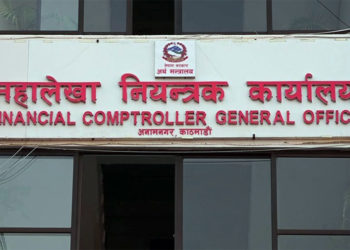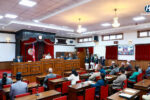KATHMANDU: Economic Digest offers a concise yet comprehensive overview of significant business happenings in Nepal, presented in easily digestible summaries.
The Nepal Rastra Bank (NRB) has amended regulations to allow foreign companies operating in Nepal without regulatory oversight to repatriate dividends abroad through self-declaration, simplifying the process compared to entities under regulatory supervision.
This move aims to streamline foreign exchange procedures, easing profit repatriation particularly for consulting firms and small to medium enterprises outside the hydropower sector.
Meanwhile, as the fiscal year nears its end, the Nepalese government has utilized only 48.13% of its allocated development funds, highlighting a significant shortfall in capital expenditure despite higher spending on recurrent expenses and debt payments.
NRB allows unregulated foreign companies to repatriate profits
Nepal Rastra Bank (NRB) has introduced new measures allowing foreign companies operating without regulatory oversight in Nepal to repatriate dividends abroad by self-declaration. This revision simplifies the foreign exchange regulations, streamlining the process for these entities.
Under the updated guidelines, foreign companies or branches under regulatory supervision in Nepal must obtain approval from the relevant regulatory bodies before repatriating profits. In contrast, entities operating without such oversight can now apply for approval based on their own declaration.
Before remitting dividends, these transactions must be disclosed to and approved by NRB. Foreign companies affected include banks, financial institutions, insurance firms, and entities from sectors outside of hydropower, typically regulated by bodies like the Department of Industry.
NRB’s recent revision is aimed at easing profit repatriation specifically for consulting firms and small to medium enterprises that do not fall under regulatory oversight.
Govt falls short in utilizing development funds
As the current fiscal year nears its end with just 15 days remaining, the government has utilized less than half of the allocated development funds for projects.
According to records from the Financial Comptroller General Office (FCGO), only 48.13 percent of the capital expenditure budget has been spent, amounting to Rs 145.39 billion out of Rs 302.07 billion allocated.
In contrast, recurrent expenses have surpassed 76 percent of the earmarked Rs 1.141 trillion, and Rs 227.65 billion has been disbursed for interest and principal payments on public debt.
Life insurance companies garner Rs 2.87 billion from Foreign Employment Insurance Premiums
In the first 11 months of Fiscal Year 2023/24, life insurance companies in Nepal have accumulated Rs 2.87 billion from premiums on foreign employment insurance.
According to the Nepal Insurance Authority, 10 out of 14 life insurance companies actively participated in issuing these premiums, totaling 2.68 million policies.
Leading the collection, Sun Nepal Life Insurance gathered the highest amount at Rs 747.9 million in premiums for foreign employment insurance.
Nepal Life followed closely with Rs 580 million, while IME Life secured the third position with Rs 341 million in premiums.
Conversely, Prabhu Mahalaxmi Life Insurance reported the lowest collection, amounting to Rs 1.8 million in premiums for foreign employment insurance.
In the month of Jestha (mid-May to mid-June), these insurance companies collectively amassed Rs 296.6 million from premiums, selling 71,078 policies, according to authority statistics.
Yogurt sales exceed Rs 2 billion on Asar 15
On Asar 15 or National Paddy Day in Nepal, yogurt sales from formal sectors alone surpassed Rs 1.54 billion. This day is traditionally observed across the country with the consumption of yogurt, beaten rice, and bananas.
Additionally, rough estimates indicate that yogurt sales from the informal sector amounted to approximately Rs 500 million on the same day.
The sales figures primarily include contributions from the Dairy Development Corporation (DDC), Nepal Dairy Association, and Dairy Industry Association. Together, these bodies sold an estimated 6.2 million liters of yogurt on Asar 15.
Health Insurance Board to introduce online enrollment for citizens
Starting in the upcoming fiscal year, which begins in the month of Shrawan (mid-July to mid-August), the Health Insurance Board will enable citizens to join the health insurance scheme from the convenience of their homes.
The new process will involve filling out an online form, for which the Board has already finalized procedures and developed necessary software.
Under the government’s new policy, individuals opting for online enrollment will need to provide a national identity card.
Previously, membership through ward offices was based on citizenship until this new system is implemented.
NRB announces foreign exchange rates
The Nepal Rastra Bank (NRB) has fixed the foreign currency exchange rates for today (Sunday).
Most foreign currencies, including the US Dollar, Euro, Pound Sterling, Dinar, and Australian Dollar, have remained stable compared to Saturday’s rates.
According to Nepal Rastra Bank, the buying rate for 1 US Dollar is fixed at NPR 133.12 and the selling rate at NPR 133.72, unchanged from yesterday.
Similarly, the buying rate for 1 Euro is set at NPR 142.48 and the selling rate at NPR 143.12 for today.
The buying rate for 1 British Pound is NPR 168.34 and the selling rate NPR 169.10.
Similarly, for the Australian dollar, the buying rate is NPR 88.60 and the selling rate NPR 89 for today.
Furthermore, the buying rate for 1 Kuwaiti Dinar is NPR 433.90 and the selling rate NPR 435.85.
Similarly, the buying rate for the Bahraini Dinar is NPR 353.11 and the selling rate NPR 354.70 for today.
(Compiled and prepared by Srija Khanal)
Economic Digest is a daily morning economic digest, basically relatable summations of the most important business news, and happenings from Nepal into easy-to-understand summaries.









Comment